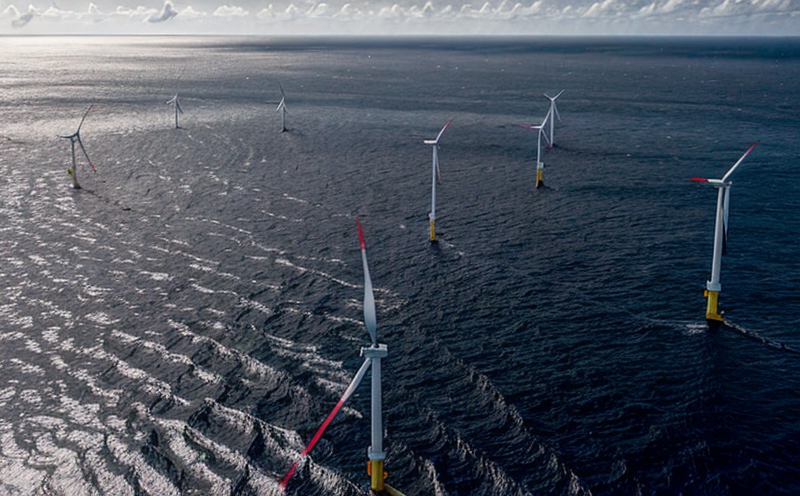EN ISO 14001 Environmental Management System Testing for Wind Farms
The implementation of EN ISO 14001:2015 is a critical step towards achieving sustainable and environmentally responsible operations in wind farms. This standard provides a framework to manage environmental aspects and impacts effectively, aiming at continuous improvement and compliance with applicable legal requirements.
The process involves the establishment of an Environmental Management System (EMS) that integrates environmental considerations into business processes through policy development, planning, implementation, monitoring, review, and management review. The EMS must be documented in a manual or equivalent means. Compliance with EN ISO 14001 is not only about meeting legal requirements but also about enhancing the organization's reputation, reducing risks, and contributing to environmental sustainability.
Our specialized testing services ensure that your wind farm meets all the stringent requirements set by EN ISO 14001:2015. We offer a comprehensive approach, including initial assessments, gap analysis, implementation guidance, training sessions for personnel involved in managing the EMS, and regular audits to maintain compliance.
The testing process typically involves several key stages:
- Initial assessment of current practices against EN ISO 14001:2015 requirements
- Gap analysis highlighting areas where improvements are necessary
- Development of an EMS manual or equivalent documentation
- Training and awareness programs for staff involved in environmental management activities
- Regular audits to ensure ongoing compliance with the standard
The testing team will work closely with your organization to identify specific needs, providing tailored solutions that align with your goals. Our experts use advanced tools and methodologies to ensure thorough evaluation and accurate results.
The benefits of implementing an EMS according to EN ISO 14001:2015 are numerous:
- Enhanced environmental performance
- Legal compliance and reduced risk of penalties
- Improved reputation among stakeholders
- Cost savings through resource optimization
- Increased efficiency in operations
- Promotion of a corporate culture that values sustainability
- Preparation for future regulatory changes and standards
Our team is dedicated to helping you achieve these benefits while ensuring your wind farm meets all the necessary criteria. By partnering with us, you can be confident in the quality and accuracy of our services.
Benefits
The implementation of EN ISO 14001:2015 brings numerous advantages to wind farms:
- Enhanced Environmental Performance: By systematically managing environmental aspects, you can minimize the negative impact on local ecosystems and communities.
- Legal Compliance: Ensuring compliance with international standards helps avoid legal issues and potential fines.
- Better Reputation: Demonstrating a commitment to sustainability enhances your organization's image among stakeholders and customers.
- Cost Savings: Efficient use of resources can lead to significant cost reductions over time.
- Operational Efficiency: Improved processes often result in enhanced operational efficiency, leading to better performance metrics.
- Sustainability Focus: A dedicated focus on sustainability fosters a corporate culture that prioritizes environmental responsibility.
- Predictability and Preparedness: By preparing for future regulatory changes and standards, you stay ahead of the curve in terms of compliance.
These benefits contribute to a more resilient and sustainable wind farm operation. Our services are designed to help you achieve these goals while ensuring continuous improvement and best practices.
Environmental and Sustainability Contributions
The implementation of EN ISO 14001:2015 plays a crucial role in promoting environmental sustainability within wind farms. By adhering to this standard, organizations can significantly reduce their ecological footprint, which is particularly important for renewable energy sectors.
Wind turbines and related infrastructure generate minimal greenhouse gas emissions during operation compared to fossil fuel-based power plants. However, the construction phase does have an impact on local ecosystems. Through EN ISO 14001:2015, wind farms can mitigate these impacts by:
- Identifying potential environmental risks and implementing mitigation strategies
- Engaging with local communities to understand their concerns
- Minimizing land use through strategic siting of turbines
- Promoting biodiversity conservation around turbine sites
- Implementing energy-efficient practices in all aspects of operation
The standard also emphasizes the importance of stakeholder engagement, which is essential for ensuring that community concerns are addressed and local ecosystems are protected. By fostering a collaborative approach with stakeholders, wind farms can contribute positively to both environmental conservation and social well-being.
Our services support this process by providing expert advice on how best to integrate sustainable practices into your operations. We help you identify opportunities for continuous improvement and implement effective strategies that align with the goals of EN ISO 14001:2015.
Competitive Advantage and Market Impact
The implementation of EN ISO 14001:2015 provides wind farms with a competitive edge in today's market, where environmental responsibility is increasingly becoming a key factor for consumers and investors. By demonstrating compliance with this standard, you can differentiate your organization from competitors who may not prioritize sustainability.
Compliance with EN ISO 14001:2015 can significantly enhance the reputation of wind farms among stakeholders, including customers, suppliers, and regulators. This enhanced reputation translates into increased trust and loyalty, which are vital for long-term success in the renewable energy sector.
In addition to improving your market position, compliance with this standard can also lead to cost savings through more efficient use of resources and reduced waste. These financial benefits contribute directly to improved profitability, making your organization more attractive to investors.
The continuous improvement aspect of EN ISO 14001:2015 ensures that wind farms are always striving for better environmental performance. This dynamic approach helps organizations stay ahead of regulatory changes and industry trends, ensuring they remain competitive in an ever-evolving market.
Our services provide the tools and knowledge necessary to achieve these benefits effectively. By working with us, you can ensure your wind farm is not only compliant but also leading the way in environmental responsibility.





